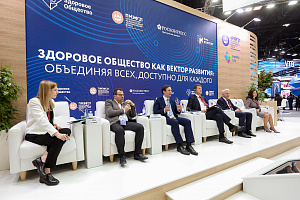The user hereby, of their own free will and in their own interests, by inputting their personal data in the personal web office of the website forbusiness.roscongress.org, consents to the processing of their personal data, given during registration, by the Roscongress Foundation (registered at 1101, entrance 7, 12, Krasnopresnenskaya nab., Moscow, 123610, Russia) under the following conditions:
Personal data is processed automatically.
Consent is given to process the following personal data: surname, name, patronymic, sex, date and place of birth, passport information (citizenship, series and passport number, home and mobile telephone numbers, information about place of work or study, photograph.
The purpose of personal data processing is to enable:
- to set up the forbusiness.roscongress.org platform created to support the needs of professionals in various sectors of the economy and present your business opportunities to a wide range of Russian and international contacts.
During the processing of personal data, the following actions will be completed: collection, recording, verification, systematization, accumulation, storage, clarification (updating or amendment), retrieval, use, transfer (distribution, provision, access), anonymization, blocking, deletion, and destruction of data.
The transfer of personal data to third parties will take place under the regulations set out in the law of the Russian Federation, and according to the agreement concluded with the involvement of the user or with the agreement of the user.
This agreement will be valid for an indefinite period, and may be rescinded by the user if he or she gives notice in writing to the Roscongress Foundation in accordance with the regulations set out in the law of the Russian Federation.
The Roscongress Foundation will cease processing of personal data and destroy it within 1 (one) month of receiving a request to cancel this agreement, or within the period specified by current legislation if the agreement is not rescinded. From the moment the Roscongress Foundation receives notice that the agreement to process personal data is to be rescinded, the right to enter the Event site will also be rescinded.

